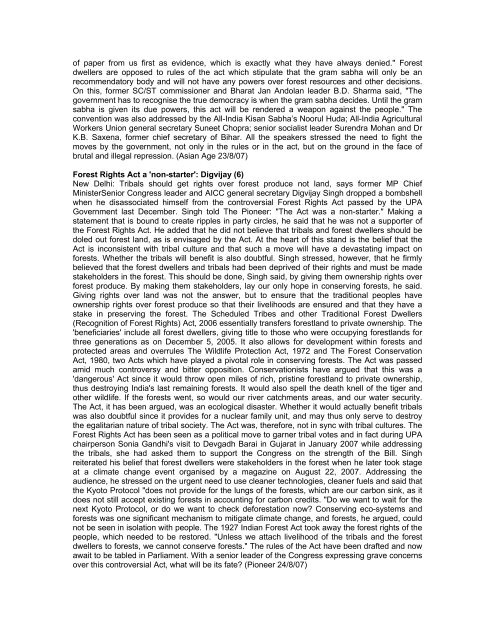TRIBALS â 2007 - Indian Social Institute
TRIBALS â 2007 - Indian Social Institute
TRIBALS â 2007 - Indian Social Institute
Create successful ePaper yourself
Turn your PDF publications into a flip-book with our unique Google optimized e-Paper software.
of paper from us first as evidence, which is exactly what they have always denied." Forestdwellers are opposed to rules of the act which stipulate that the gram sabha will only be anrecommendatory body and will not have any powers over forest resources and other decisions.On this, former SC/ST commissioner and Bharat Jan Andolan leader B.D. Sharma said, "Thegovernment has to recognise the true democracy is when the gram sabha decides. Until the gramsabha is given its due powers, this act will be rendered a weapon against the people." Theconvention was also addressed by the All-India Kisan Sabha’s Noorul Huda; All-India AgriculturalWorkers Union general secretary Suneet Chopra; senior socialist leader Surendra Mohan and DrK.B. Saxena, former chief secretary of Bihar. All the speakers stressed the need to fight themoves by the government, not only in the rules or in the act, but on the ground in the face ofbrutal and illegal repression. (Asian Age 23/8/07)Forest Rights Act a 'non-starter': Digvijay (6)New Delhi: Tribals should get rights over forest produce not land, says former MP ChiefMinisterSenior Congress leader and AICC general secretary Digvijay Singh dropped a bombshellwhen he disassociated himself from the controversial Forest Rights Act passed by the UPAGovernment last December. Singh told The Pioneer: "The Act was a non-starter." Making astatement that is bound to create ripples in party circles, he said that he was not a supporter ofthe Forest Rights Act. He added that he did not believe that tribals and forest dwellers should bedoled out forest land, as is envisaged by the Act. At the heart of this stand is the belief that theAct is inconsistent with tribal culture and that such a move will have a devastating impact onforests. Whether the tribals will benefit is also doubtful. Singh stressed, however, that he firmlybelieved that the forest dwellers and tribals had been deprived of their rights and must be madestakeholders in the forest. This should be done, Singh said, by giving them ownership rights overforest produce. By making them stakeholders, lay our only hope in conserving forests, he said.Giving rights over land was not the answer, but to ensure that the traditional peoples haveownership rights over forest produce so that their livelihoods are ensured and that they have astake in preserving the forest. The Scheduled Tribes and other Traditional Forest Dwellers(Recognition of Forest Rights) Act, 2006 essentially transfers forestland to private ownership. The'beneficiaries' include all forest dwellers, giving title to those who were occupying forestlands forthree generations as on December 5, 2005. It also allows for development within forests andprotected areas and overrules The Wildlife Protection Act, 1972 and The Forest ConservationAct, 1980, two Acts which have played a pivotal role in conserving forests. The Act was passedamid much controversy and bitter opposition. Conservationists have argued that this was a'dangerous' Act since it would throw open miles of rich, pristine forestland to private ownership,thus destroying India's last remaining forests. It would also spell the death knell of the tiger andother wildlife. If the forests went, so would our river catchments areas, and our water security.The Act, it has been argued, was an ecological disaster. Whether it would actually benefit tribalswas also doubtful since it provides for a nuclear family unit, and may thus only serve to destroythe egalitarian nature of tribal society. The Act was, therefore, not in sync with tribal cultures. TheForest Rights Act has been seen as a political move to garner tribal votes and in fact during UPAchairperson Sonia Gandhi's visit to Devgadh Barai in Gujarat in January <strong>2007</strong> while addressingthe tribals, she had asked them to support the Congress on the strength of the Bill. Singhreiterated his belief that forest dwellers were stakeholders in the forest when he later took stageat a climate change event organised by a magazine on August 22, <strong>2007</strong>. Addressing theaudience, he stressed on the urgent need to use cleaner technologies, cleaner fuels and said thatthe Kyoto Protocol "does not provide for the lungs of the forests, which are our carbon sink, as itdoes not still accept existing forests in accounting for carbon credits. "Do we want to wait for thenext Kyoto Protocol, or do we want to check deforestation now? Conserving eco-systems andforests was one significant mechanism to mitigate climate change, and forests, he argued, couldnot be seen in isolation with people. The 1927 <strong>Indian</strong> Forest Act took away the forest rights of thepeople, which needed to be restored. "Unless we attach livelihood of the tribals and the forestdwellers to forests, we cannot conserve forests." The rules of the Act have been drafted and nowawait to be tabled in Parliament. With a senior leader of the Congress expressing grave concernsover this controversial Act, what will be its fate? (Pioneer 24/8/07)
















